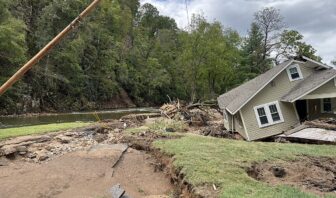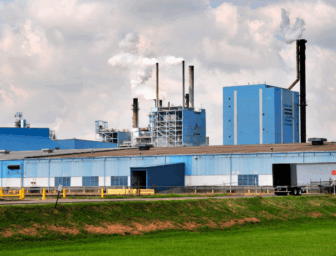Four shareholder resolutions challenging Dominion over inaction on climate change risks also garner unprecedented levels of support
CLEVELAND—Dominion Resources’ controversial proposal to build a liquefied natural gas (LNG) export facility at Cove Point in southern Maryland drew protest from anti-fracking activists in Ohio today, as the company’s CEO, board and shareholders convened for their annual meeting in Cleveland. The demonstration outside the meeting, organized by the Ohio Sierra Club, Ohio Student Environmental Coalition, and the Energy Action Coalition, is the latest example of the growing, regional opposition to Dominion’s $3.8 billion Cove Point plan, which advocates warn would incentivize a wave of new fracking and worsen the climate crisis.
“It is clear that Dominion’s agenda to export natural gas puts Ohioans at risk to more fracking, higher energy costs and more extreme weather,” said Brian Kunkemoeller, conservation manager at the Ohio Sierra Club. “Energy independence and curbing climate change starts and ends with clean energy sources like wind, solar, and geothermal — and that’s what we’re calling for today.”
On the eve of the meeting, a Dominion shareholder joined the Chesapeake Climate Action Network in filing an official complaint with the U.S. Securities and Exchange Commission (SEC) over Dominion’s failure to adequately disclose significant financial and environmental risks associated with the LNG export project. Dominion is seeking SEC approval to raise project funds through an initial offering of public stock.
Meanwhile, inside Wednesday’s meeting, Dominion faced unprecedented levels of shareholder concern over the financial and environmental risks of its expanding dirty energy portfolio. Of six shareholder resolutions presented, four were brought by Virginians concerned about the company’s failure to address and act upon the risks of climate change. Each of these four resolutions garnered more than 20 percent of the shareholder vote, compared to previous years in which only one sustainability resolution, focused on the financial risks of climate change, had garnered more than 10 percent of votes in support. (In 2013, that resolution received a then-unprecedented 22.6 percent of shareholder votes.)
“I have been involved in shareholder advocacy with Dominion since 2008, and I am saddened and frightened by their continued negligence on climate change,” said Ruth McElroy Amundsen, a shareholder from Norfolk, Virginia. “Dominion is the largest carbon emitter in a state where coastal cities like mine already see regular and costly flooding due to sea level rise. The resolution I presented this year asks Dominion to set a clear goal for reducing its greenhouse gas pollution, as opposed to the nearly 60 percent increase they are projecting over the next two decades.”
Specifically, the resolutions presented by Virginia shareholders call on Farrell and Dominion’s board to:
- Report on the financial risks posed to Dominion by climate change (24% of shareholders voting yes, representing $7.68 billion in shares);
- Report on how Dominion is measuring and reducing methane emissions, a powerful cause of global warming (21% voting yes);
- Report on the climate change impacts of the company’s reliance on biomass, or wood-burning, for energy (21% voting yes); and
- Adopt quantitative goals for reducing Dominion’s overall emissions of heat-trapping greenhouse gases (20% voting yes).
“Dominion plans for huge increases in its natural gas transmission capacity, including exports overseas via Cove Point that will promote increased fracking in eastern states,” said Seth Heald, a Dominion shareholder from Rixeyville, Virginia. “Methane leaks from fracking and natural gas transmission are a grave climate threat, because methane is a greenhouse gas that is far more potent than carbon dioxide. We’re calling on Dominion to take this threat seriously by providing full disclosure of methane emissions and setting concrete, aggressive goals for reducing them.”
As shareholders pointed out, even as Dominion plans to build the massive Cove Point gas export facility in Maryland, the company currently generates no utility-scale wind or solar power in Virginia. Instead of developing these renewable resources, Dominion is proposing to build seven new centralized, polluting power plants in the state over the next 15 years.
“Climate change is already impacting Dominion’s bottom line. In fact, the company recently moved to raise electric rates for Virginia customers by over 4 percent due to rising gas prices linked to this winter’s extreme weather,” said Emily Heffling, Virginia Field Organizer at the Chesapeake Climate Action Network, who presented the financial risk resolution. “If Dominion refuses to be part of the solution, the least the company should do is come clean on the costs to shareholders. Many other large U.S. companies are conducting assessments of business risks posed by climate change, and our resolution simply asks Dominion to provide the same transparency.”
Resources for journalists:
- View the SEC complaint filed yesterday warning of potential investor risks in Cove Point LNG exports.
- View shareholder’s climate resolutions, supporting statements, and opposition statements in Dominion’s 2014 proxy (p. 70-81).
- See the Plain Dealer op-ed, “Dominion shareholders should slow rush to export liquefied natural gas,” by Mike Tidwell and Robert Shields.
- For more information on the Cove Point LNG export project, see www.stopcovepoint.org.
Contact:
Kelly Trout, Chesapeake Climate Action Network, 240-396-2022, kelly@chesapeakeclimate.org
Brian Kunkemoeller, Ohio Sierra Club, 513-213-5165, brian.kunkemoeller@sierraclub.org
###





